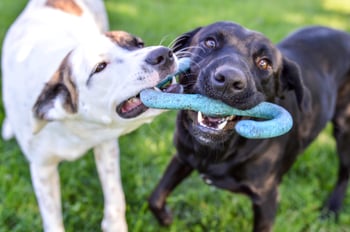Dog Temperament Tests: Best Practices for Daycares
While most pet owners think their furbaby is perfect, dog daycare owners can’t take their word for it. Most dog daycares offer temperament testing. Temperament testing, also called behavior evaluation, is a vital step to ensure your dog daycare clients' and staff’s safety. While not required by law, it is in your best interest as a dog daycare owner to protect yourself, your staff, and your furry guests from harm. In addition to injury, an accident in your facility could cause financial ramifications and adverse effects on your reputation.
Think about it; a dog mom wants to take her furbaby to the safest place possible. If your daycare has a reputation for aggressive dogs and fighting, that dog mom will choose another daycare because she doesn’t want to take the risk. Even if the incident only happened once, it possibly could have been avoided with temperament testing, Just like us, dogs have moods. We aren’t always friendly, and neither are they. This is why your daycare must require a dog temperament test for every dog that comes under your care.
 What is a dog temperament test?
What is a dog temperament test?
A dog temperament test evaluates if a dog will play and interact well with other dogs. The temperament test checks for signs of aggression or issues affecting a dog’s ability to interact with other dogs and people safely. These tests significantly reduce the risk of accepting dogs that may injure themselves, other dogs, and your staff. Dogs may fail a dog daycare temperament test if:
- They lunge or growl at people or dogs.
- They snap or bite people or dogs.
- They cower, show signs of anxiety, nervousness, and fear around dogs.
Dog Temperament Testing Process
There is no standard process for conducting a dog temperament test, and the process varies from daycare to daycare. Because of this, you may encounter pet parents who present you with a testing certificate from another daycare, facility, or trainer. Establish clear acceptance and testing policies to require your own assessment, regardless if a pet parent has a certificate from somewhere else.
The dog temperament testing process is quick, and you should offer it for free, as it’s a safety requirement for your daycare. It’s imperative to hire a dog trainer to train your staff on how to safely conduct this type of test. The testing process generally consists of the following steps:
1. Intake Paperwork and Pet Parent Interview Before a dog can enter your facility, a staff member talks with the pet parent and asks them to complete a form. During the interview, get the pet parent’s contact information and discuss whether their dog has had past problems with aggression or behavioral issues. The intake form should ask for veterinarian information and vaccination records. The pet owner also needs to sign an agreement that details legal issues and liabilities.
2. Evaluation After the pet owner completes the initial interview and paperwork, it’s time for evaluation. Invite the pet parent and their dog to your daycare for an evaluation appointment. Be clear when you make the appointment to explain the dog will go through a short temperament test. Be prepared to answer the pet parent’s questions about the process. For the first part of the test, separate the pet parent and the dog to assess how the dog behaves without their owner. If the dog acts aggressively or dangerously, stop the test and send them home with their owner. If the dog does well with the first part of the test, introduce them to calm and interactive dogs at the daycare. Pay attention to how the dog reacts to meeting, playing, and engaging with new dogs. The final part of the test includes props. Introduce toys and food to see if the dog has territorial issues.
3. Assessment If at any point during the test, the dog displays aggression or behavioral issues, stop the test. Tell the owner what happened and that their dog is not a good fit for your daycare. Even if a dog is not aggressive, it’s important to make notes in their profile about their personality characteristics, including separation anxiety, timidness, toy aggression, leash aggression, and other behaviors that may present risks to the dog or other guests. These notes will help your staff assign dogs to the best playgroups.
Dog Temperament Test Best Practices
Follow these best practices to ensure the dog temperament testing process is efficient and consistent.
Create a formal acceptance policy.
To ensure your dog daycare maintains a valid process for assessing and accepting dogs into daycare, outline the evaluation process, behavioral and personality traits required for acceptance, and traits that disqualify a dog from engaging in your daycare.
Train your staff in temperament testing.
It’s imperative your staff is trained and well-versed on the testing process and the acceptance policy. Institute best practices to ensure consistency and clarity, including:
- Hire a dog trainer to train your staff on how to safely test and assess dog temperament.
- Train your staff on the acceptance policies and ensure they communicate them clearly to prospective customers.
- Train staff on the testing process and enforce consistent assessment standards.
- Facilitate communication between staff members to discuss every dogs’ temperament test outcome so there are no surprises during playtimes.
Assign specific staff members to perform the dog temperament test.
Having a designated team of testers ensures the same standards and outcomes are applied across the board. This process enables staff members to master the testing and assessment process.
Use pet business software.
If a dog has been accepted or accepted with limitations, you need to maintain records of the evaluation and have this information easily available when a staff member views pet information or reservation requests. Pet business software makes this process quick and easy. With Revelation Pets, you can:
- Leave notes in the Pet Profile to alert staff of potential issues, i.e., ‘shy around big dogs; food aggressive.’
- Utilize the Report Card function to note guest behavior for pet parents, i.e., ‘At first, Lucy was terrified of another dog and didn’t want to play. But once we separated them into different playgroups, she had a blast!”
- Use Custom Icons to tag a dog’s profile, i.e., ‘accepted with limitations.’
Now it’s time to perform dog temperament testing in your dog daycare! Testing protects your staff, dog clients, and your reputation. Not only does pet business software make this process easier, but it also helps you manage operations efficiently.






